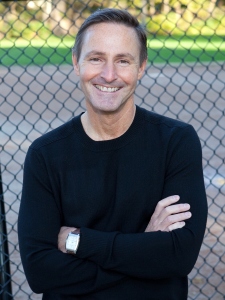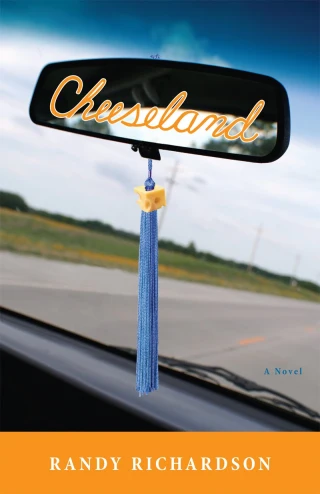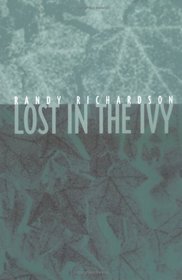
Randy Richardson is no stranger to Chicago’s literary scene. A journalist, essayist, and the president of the Chicago Writers Association, his debut novel Lost in the Ivy was named one of 2005’s notable Chicago books by Gapers Block. Now Richardson is back with his new novel Cheeseland, and the local lit world is buzzing again. Favorably compared to the work of Dennis Lehane and Nicholas Sparks, Cheeseland tells the tragicomic coming-of-age story of Lance Parker and Daniel McAllister, two Southside teens who embark on a Wisconsin road trip to mend their fractured friendship. A 2011 Evie Fiction Finalist, Cheeseland has been described by author Christine Sneed as an unforgettable page-turner that “reminds us that adolescence can be a land of thrilling self-discovery and of serious danger.” On Thursday, January 24th, you can hear Mr. Richardson read from Cheeseland when he visits EPL’s 1st Floor Community Meeting Room at 6:30 p.m. along with local authors Gail Lukasik and Jerry Jaffe. In anticipation of his visit, we recently spoke with him via email about his real-life inspirations for the book, the destructive nature of secrets, what’s new at CWA, and his favorite reads from 2012.
Evanston Public Library: Cheeseland has been favorably compared to the work of Dennis Lehane, Frank McCourt, Nicholas Sparks, and Larry McMurtry. What is your reaction to such high praise, and do you feel any literary kinship with these particular authors? Which books and writers have most influenced your own fiction?
Randy Richardson: Well, it is flattering, of course. I don’t feel I’m worthy of such high praise, though it is nice to be placed in such esteemed company. I honestly do not feel any particular literary kinship with any of those authors. While I do see how others might see some of them in Cheeseland, I wasn’t inspired by them or any of their books. My style of writing is deeply indebted to Ernest Hemingway. The bleak, darkly comic, minimalist tone of Cheeseland is largely inspired by Denis Johnson’s novel about grief The Name of the World. And I’ve always loved the coming-of-age genre – most notably Harper Lee’s To Kill a Mockingbird, J.D. Salinger’s The Catcher in the Rye – which also influenced my writing of Cheeseland.
 EPL: Could you give us a window into your creative process? Where did the idea for Cheeseland originate? How much of the novel was pre-planned, and how did it evolve over time? How did the experience compare to your work on Lost in the Ivy?
EPL: Could you give us a window into your creative process? Where did the idea for Cheeseland originate? How much of the novel was pre-planned, and how did it evolve over time? How did the experience compare to your work on Lost in the Ivy?
RR: “Cheeseland” refers to Wisconsin, the nation’s leading cheese producer. When you cross the border from Illinois on Interstate 94, this is immediately brought home to you when you are met by the Mars Cheese Castle, a landmark tourist destination. But for me “Cheeseland” is really a place that no longer exists. When I was a teen growing up in the suburbs of Chicago, back in the late ’70s, the drinking age in Wisconsin was 18. So I, and many other teens like me, would trek to Wisconsin to lead a life that blurred the line between adolescence and adulthood. Not surprisingly, this oftentimes led us to get in trouble.
The book is inspired by one of those real life road trips across the border, when I joined two friends for a rock concert at Alpine Valley. After the concert, we returned to our campsite at Big Foot Beach in Lake Geneva. The night should have ended there but it didn’t because one of my two buddies wanted to get a bite to eat. I handed him the keys to my car and that was the last thing I remember until I found myself lying on a curb outside of a late-night tavern in Kenosha, blood trickling out of my forehead. My friend had crashed the car into a parked car, and I have these hazy memories of the owner of the other car yelling at him for hitting his car while I lay there bleeding and my friend trying to tell this guy that I needed help. I was very fortunate in that the only physical injuries I incurred were some minor cuts and abrasions to my forehead, which had struck the windshield when the car collided with the parked car. That entire scene gnawed at my for thirty years and developed into Cheeseland.
The seed for the second part, which takes place 30 years later, wasn’t conceived until I was well along in the process of writing the story. I don’t work from an outline, but instead have a general notion of what I want to write in my head and sort of dive in and see where that idea goes. But that second part of the story is really a reflection of the length of time it took me to write the novel and how I was changing. I was learning how to be a parent as I was writing this story, and it occurred to me that it would be interesting to see how (or if) these two characters would grow as they became older. I separated them by thirty years because that was how long it had been for me since I was a teen.
 In comparing the writing process for my first novel, Lost in the Ivy, with that of Cheeseland, they are actually quite similar in that real-life events inspired both novels, and I wrote both without having any kind of outline. I literally write without a compass. To me, that’s what makes writing fun – finding where it takes you. All those twists and turns that the reader experiences were first experienced by me. No one is more surprised than me where these stories end up going.
In comparing the writing process for my first novel, Lost in the Ivy, with that of Cheeseland, they are actually quite similar in that real-life events inspired both novels, and I wrote both without having any kind of outline. I literally write without a compass. To me, that’s what makes writing fun – finding where it takes you. All those twists and turns that the reader experiences were first experienced by me. No one is more surprised than me where these stories end up going.
EPL: Cheeseland closely examines how secrets can be destructive to families, friendships, and marriages. Can you discuss how secrecy undermined Lance and Daniel’s complicated friendship? At what point do loyalty and a desire for privacy cross over into harmful secret keeping? Are secrets ever beneficial to a relationship?
RR: I think that young men like the characters of Lance and Daniel are particularly susceptible to the difficulties that can come from not confronting serious issues. They avoid talking about these taboo subjects because it is easier not to talk about them. The problem is, as these characters discover, these issues don’t just disappear; rather, they fester and continue to grow until they become destructive. I don’t think these characters are all that uncommon, unfortunately. We see these kinds of stories more and more in the daily news. One of the main messages I hope to illustrate in this book is the importance of just talking, openly and honestly, to your friends, to your parents, to your teachers, to your counselors and other medical professionals. A lot of smaller problems can be stamped out early before they grow into bigger problems just by talking about them. Everyone has a right to privacy, but if the secret is causing harm, it is probably time to open up. Are secrets ever beneficial to a relationship? It depends what secret you are keeping, if it is harmless or not, and if the person whom you are keeping the secret from will benefit from the knowledge, however much they may be hurt.
EPL: Can you discuss the theme of second chances in Cheeseland, and more specifically, how religion and spirituality are involved? What makes Daniel so receptive to Buck’s message and Lance so resistant?
RR: It may come as a surprise to readers of Cheeseland to learn that I am not a particularly religious person. When my mother read that scene in the church where Buck preaches to Lance and Daniel, she couldn’t believe it came out of me, because other than for weddings, I haven’t been in a church since I was a kid. But I like characters that turn out to be something very different than what you think they are. So religion/spirituality became a device to teach a lesson to these teen characters in Cheeseland. It also served as a device to show how different the two boys really are. I think Daniel is receptive to Buck’s message because he doesn’t have any answers and desperately wants some. He is the one who has never done anything but follow Lance like a lost puppy. In contrast, Lance is resistant to Buck’s message because he thinks he already has all the answers. He has never needed anyone to guide or lead him. As they grow older, it is this very resistance that makes it so hard for him to truly grow up.
 EPL: Can you give Cheeseland fans a sense of what you’re working on next? Do you have any ideas brewing for another novel? What will 2013 bring for the Chicago Writers Association?
EPL: Can you give Cheeseland fans a sense of what you’re working on next? Do you have any ideas brewing for another novel? What will 2013 bring for the Chicago Writers Association?
RR: I’m working on promoting Cheeseland. I never mix promotion and writing, to me they don’t go together well. My mind just doesn’t work that way. I wish it did, I’d be a much more prodigious writer. The reality is that I don’t have the time to do both. I do have a few ideas cooking up in my head, but I won’t start putting those onto a Word document until I close the book on Cheeseland. I anticipate that my resolution for 2013 will be to start writing that next novel.
As for the Chicago Writers Association, we will be hosting our 2nd Annual Book of the Year Awards on Saturday, January 19, at the Book Cellar in Lincoln Square. We invite all book lovers to join us at this free celebration. We are also very excited to be launching – in conjunction with Teen Writers and Artists Project and DuPage Writers Group – a live theatrical reading series, Lit Lab, in the west suburbs in 2013. This series will run the second Friday every other month, beginning February 8 at The Art Spot in Wheaton, and it will feature teen and adult writers reading their original fiction, non-fiction and poetry. Another big change for the CWA in 2013 is that its most ambitious project, the Chicago Literary Hall of Fame is breaking away to start its own new chapter as an independent nonprofit. While CWA will continue to support the CLHoF in any way it can, we are cutting ties to allow the CLHoF to spread its own wings and to hopefully thrive with its own Board of Directors devoted solely to its mission. So there is much to look forward to for both the CWA and the CLHoF in 2013.
EPL: Since this is the season of booklists, can you share some of your personal favorites from 2012? Better yet, what was the one book you read this year that meant the most to you regardless of the year it was published?
RR: The book that I read in 2012 that most strongly affected me shows that big things can come in small packages. It is another Denis Johnson novella, Train Dreams, a book originally published in the Paris Review in 2002, reprinted in 2011, and short-listed for the Pulitzer in 2012, the year the Pulitzer Committee infamously decided not to give an award for fiction. How sad it is that Train Dreams did not win the Pulitzer, because it is such a spare but beautifully atmospheric work of fiction, telling the story of how a seemingly simple life can be anything but. At 128 pages, you can read it in two hours, and it is time well spent. A small masterpiece.
 On a local level, the book that most touched me is Bree Housley’s We Hope You Like This Song, the author’s true story of her friendship with Shelly and what she did to bring her friend’s spirit back after she died from complications during pregnancy at the age of 25. This is a book that could easily have been a real downer. But don’t fret, Housley never lets that happen. She tells the story with humor, charm and brutal honesty, and at the end you feel as if you’ve made a new friend. Along the way, you’ll laugh and you’ll cry, and if you’re anything like me, you’ll be inspired to donate to The Preeclampsia Foundation. This is a touching story that will make you think about your own friends and loved ones, and why you shouldn’t wait to tell them what they mean to you. For me, Bree Housley’s We Hope You Like This Song hit all the right notes.
On a local level, the book that most touched me is Bree Housley’s We Hope You Like This Song, the author’s true story of her friendship with Shelly and what she did to bring her friend’s spirit back after she died from complications during pregnancy at the age of 25. This is a book that could easily have been a real downer. But don’t fret, Housley never lets that happen. She tells the story with humor, charm and brutal honesty, and at the end you feel as if you’ve made a new friend. Along the way, you’ll laugh and you’ll cry, and if you’re anything like me, you’ll be inspired to donate to The Preeclampsia Foundation. This is a touching story that will make you think about your own friends and loved ones, and why you shouldn’t wait to tell them what they mean to you. For me, Bree Housley’s We Hope You Like This Song hit all the right notes.
As a side note, I met Bree for the first (and so far only) time when we were both on the bill to do readings as part of a local author night at an indie bookstore in Chicago. It struck me when she read an excerpt from We Hope You Like This Song that our books were destined to find one another, and not just because Bree and Cheeseland seem like a perfect pairing. While my book is fiction (albeit reality-based) and hers is non-fiction, they both are about friendships and death and how we cope with loss. In both of our books, music plays an integral role. Bree writes, “Music speaks to us in ways people can’t, takes us back to places we can no longer go, and brings out emotions we can’t control. When you open your ears, you open your soul.” At the bookstore, she handed out mix tapes that go along with her book. Much like Bree’s book, music constantly plays in the background of my book. The two main characters always seem to be battling for control of the 8-track player. On my blog, I provide a playlist of songs, which I titled “Cheese Curds.” I wrote, “When you’re a teenager, music means more to you than at any other time in your life… The songs that I listened to then have stuck with me for the thirty-plus years that have followed. They take you back to a time and a place when life was so much simpler and so much more complex.” Two books, one serendipitous reading.
Interview by Russell J.
